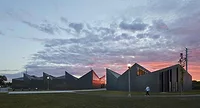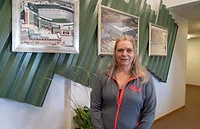S-5! Celebrates 30th Anniversary Serving Roofing Contractors
Metal Roofing Pioneers Share Origin Story That Spurred Three Decades of Innovation, Success
.webp?t=1657906082)
The beginnings of S-5! is a tale steeped in history. It all began in 1991. Rob Haddock had been a long-time contractor and consultant in the metal roofing and metal construction industry — having learned ground-up, straight from the trenches, all about erecting metal buildings and metal roofing. Throughout his contracting career, he was always innovating and discovering different and better ways to do things. He realized the attachment of anything to standing seam roofing without violating the integrity of the roof seemed impossible.
“People needed to put things on their roofs, but there just wasn’t a good way to do it,” said Haddock, S-5! CEO and founder. “I began tinkering with ideas to solve this age-old problem. I got the idea to pinch and grip the seam in a clamping kind of way; using a block with a slot that would straddle the seam, like a saddle on a horse — I know something about that stuff.
“I whittled my first prototype from a small block of wood. Then I had a local shop make one from aluminum and tested it for holding strength. That baby hung on like country music.”
 S-5! Prototype Wooden Clamps
S-5! Prototype Wooden Clamps
Rejection Spurs Determination
After taking his prototype to four major metal construction companies most suited to take his invention to market successfully, every one of them turned him down, saying things like "There is no market for this kind of thing.” Haddock also took it to machine shops and was told production was impossible at an affordable price.
“I never thought about giving up,” said Haddock. “I just had to do it myself. I learned more about metals than I ever wanted to know; I learned more about manufacturing than I ever wanted to know; I learned more about marketing than I ever wanted to know.”
He then took it to the big building and roofing OEMs in the industry, only to receive more rejection, hearing a common response of “We don’t want anything mounted on our roofs."
“Having worked in the industry for many years, I made some good friends — Kenny Buchinger, MBCI; Dick Bus, ATAS International; Mike Peterson, Peterson Aluminum; John Griffith, Mizel Brothers Insulation; and Angelo Borzillo (co-inventor of Galvalume®),” said Haddock. “They were good friends to have because they all had their feet in the trenches and had been on a lot of roofs. They all encouraged me.
“I remember John Griffith sitting by my fireplace. He said, 'You know what Haddock, I think you’ve got a game-changer here.' Kenny had the same reaction, and matter of fact he said, 'I need some of these for a job right now!'"
 FROM LEFT: Harry Carner and Rob Haddock.
FROM LEFT: Harry Carner and Rob Haddock.
Innovation Meets Manufacturing
In 1993, Haddock met Harry Carner, who had a decades-long tenure in the aluminum extrusion industry and manufacturer of all things aluminum. He was sold on the concept of adding value to extruded goods and a master of process manufacturing and fabrication.
He had been in management, frontline supervision in manufacturing, plant engineering, plant maintenance, and performing tool and die type work. Additionally, he had worked in aluminum smelters and in the production of raw aluminum — as well as everything else that has to do with aluminum production, be it anodizing, powder-coating, fixturing or machining-work. He always ended up in a position working for companies unable or unwilling to give him the equipment he needed to streamline manufacturing in a meaningful way.
The Twain Shall Meet
To manufacture his invention, Haddock took it to a company where Carner was the plant manager. For the next 18 years, Haddock kept innovating new things and teaching Carner more about how and why they are used within the metal roofing industry. Carner figured out how to manufacture them, and in turn, taught Haddock all about aluminum extruding and manufacturing processes.
Over time, the two innovators developed a relationship of mutual respect. They both had plenty of experience with their feet in the trenches — Haddock in construction and Carner in manufacturing. They were both pragmatic renegades — rule-breakers who challenged convention and status quo — outside-the-box thinkers always looking for better ways to do things.
Innovation and Entrepreneurial Spirit Applied to Mass-Manufacturing for Economy
In 2011, the two innovators joined forces, bringing production of all S-5! products under one roof — to serve the metal roofing industry and to further spread their unparalleled expertise in developing clamps and brackets unequaled in holding strength, enhanced by innovative manufacturing techniques and unmatched in certified quality, performance, cost efficiency and real value.

Fast Forward 30 years
“Thirty years ago, it was taboo to attach anything to a metal roof,” said Haddock. “Standing seam metal roofing had been around for 1,200 years, and no one had ever come up with a good way to attach things like snow guards without compromising the roof’s integrity. S-5! precipitated a total paradigm shift.“
Fast forward to 2022. Standing seam has become one of the most user-friendly roof types because it's much easier to attach things without penetrating the roof, said Haddock.
Haddock's “small idea” of using a block with a slot that would “straddle the seam — like a saddle on a horse” has snowballed into a wide array of clamps and other innovations, ultimately becoming the S-5! family of products.
With all three of his adult children now in the family business, along with a team of professionals, a testing lab and its own ISO-certified manufacturing facility, S-5! continues to innovate new and better solutions in a constant product improvement and invention/reinvention mode within the product category it originally created.
Iowa Park, Texas (northwest of Wichita Falls) is the home of the S-5! manufacturing plant. Under the supervision of Carner, vice president of manufacturing, the 74,000-square-foot state-of-the-art facility is where millions of clamps and brackets start as simple extrusions and eventually get cut, deburred, machined, punched, packed and sent on their way to metal roofs in 70 countries worldwide from A to Z (Australia to Zimbabwe).
S-5! metal roof attachments can be found on more than 2 million roofs, including 5.4 gigawatts of solar arrays on some of the world’s notable buildings such as Costco, FedEx and the corporate headquarters for Apple, Google, IBM, NATO and NREL, not to mention 15,000 affordable residential solar installations.
Looking for a reprint of this article?
From high-res PDFs to custom plaques, order your copy today!







